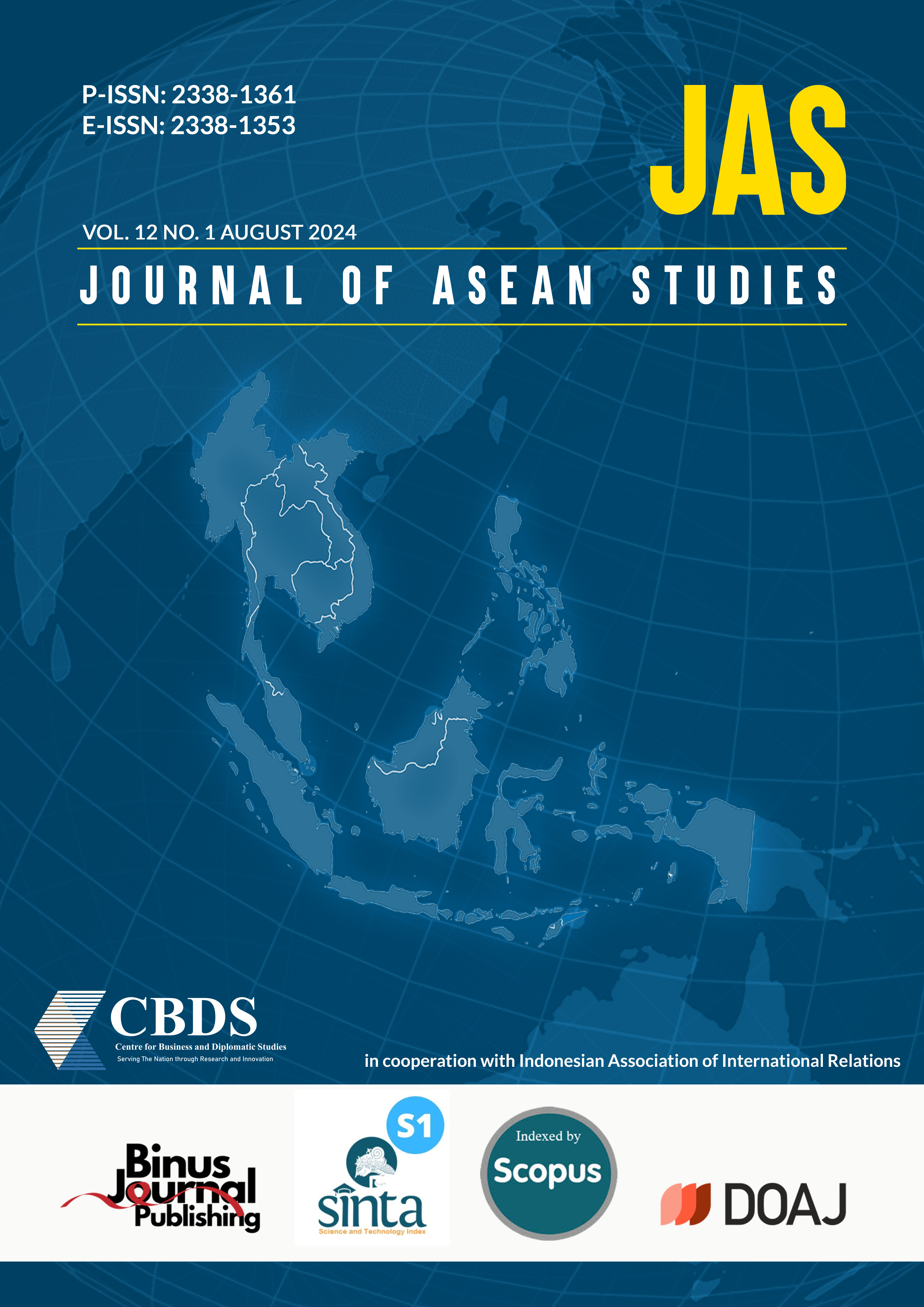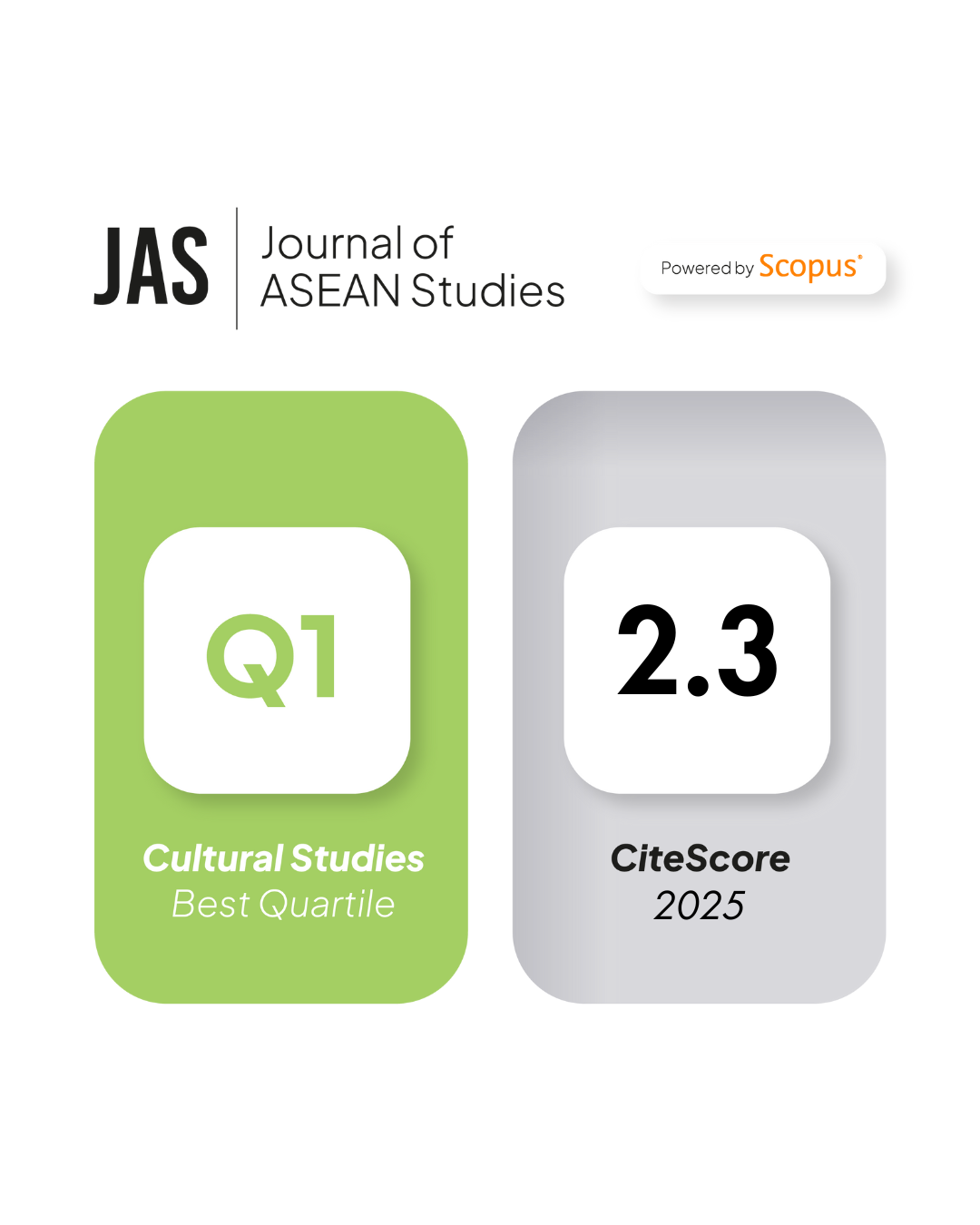Navigating Turbulence: ASEAN’s Leadership Challenges in the Human Rights Violation in Myanmar and South China Sea Dispute
DOI:
https://doi.org/10.21512/jas.v12i1.11158Keywords:
Leadership, ASEAN, Regionalization, Human Rights, South China SeaAbstract
The Association of Southeast Asian Nations (ASEAN) is one of the most rapidly growing regional organizations, significantly influencing the geopolitical landscape of Southeast Asia and beyond. Despite these successes, however, ASEAN currently faces serious challenges in maintaining its unity, solidarity, and cohesiveness. A critical issue is the divergence in views, attitudes, and policies of member countries on crucial political and security matters. This study explores the concept of leadership within the structure of regionalization in the Association of Southeast Asian Nations (ASEAN). The concept is shaped by structural capabilities derived from the region's resource production and manpower, with charisma playing a crucial role in leadership. Based on this concept, this study explores the leadership role in ASEAN's efforts to address current and upcoming issues, particularly about human rights abuses in Myanmar and South China Sea disputes. This study compares Indonesia's leadership within ASEAN to that of other member states using a qualitative comparative case study design. This method investigates how different elements affect the phenomenon that is being studied. A more nuanced understanding of the complex relationships between various variables, including leadership, domestic turmoil, and regional dynamics, can be obtained through the analysis of cases in real-life contexts. The study posits that ASEAN will not be able to uphold its integrity and accelerate the realization of a harmonious ASEAN society in the future without robust leadership. Unlike in its early years, ASEAN today lacks a leader capable of mobilizing political resources to address and resolve collective issues within the organization.
References
Acharya, A. (2003). Constructing a security community in Southeast Asia. London and New York: Routledge.
Alagappa, M. (1995). Political legitimacy in Southeast Asia: The quest for moral authority. Stanford: Stanford University Press.
Anwar, D. F. (2013). Reinvention in Indonesia’s foreign policy strategy. East Asia Forum Quarterly: Economics, Politics, and Public Policy in East Asia and the Pacific, 5(4), 10-11.
Beech, H. (2020, July 28). Najib Razak, former Malaysian leader, found guilty in 1MDB corruption trial. Retrieved from https://www.nytimes.com/2020/07/28/world/asia/najib-razak-malaysia-1mdb.html.
Buzan, B. (1991). People, states, and fear: An agenda for international security studies in the post-cold war. Colorado, USA: Lynne Reinner Publisher.
Caballero-Anthony, M., & Cook, A. D. (2013). Non-traditional security in Asia. Singapore: Institute of Southeast Asian Studies.
Chap, C. (2023, September 12). ASEAN remains divided over China’s assertiveness in South China Sea. Retrieved from https://www.voanews.com/a/asean-remains-divided-over-china-s-assertiveness-in-south-china-sea/7264923.html.
Collins, A. (2001) The security dilemmas of Southeast Asia, Singapore. Singapore: ISEAS Publishing.
Darmawan, A. R. (2021). ASEAN’s dilemma in the South China Sea: Can the regional organisation be useful in such a heated dispute? Retrieved January 15, 2024 from https://www.policyforum.net/aseans-dilemma-in-the-south-china-sea/.
Delatour, G. S., Weber, M., Henderson, A. M., & Parsons, T. (1948). The theory of social and economic organization. American Sociological Review, 13(3), 349-351. https://doi.org/10.2307/2086579.
Emmerson, K. D. (2009). Security, democracy, and regionalism in Southeast Asia. Singapore: ISEAS.
Hoadley, S., & Ruland, J. (2006). Asian security reassessed. Singapore: Institute of Southeast Asian Studies.
Hoi. (2022, August 7). A future-proof and forward-looking ASEAN economic community - Academia - The Jakarta Post. Retrieved January 15, 2024 from https://www.thejakartapost.com/opinion/2022/08/07/a-future-proof-and-forward-looking-asean-economic-community.html.
Kaarbo, J., & Beasley, R. K. (1999). A practical guide to the comparative case study method in political psychology. Political Psychology, 20(2), 369-391.
Kausikan, B. (2015). ASEAN and East Asia in the era of global restructuring. Asian Politics & Policy, 7(1), 145-155. https://doi.org/10.1111/aspp.12172.
Kegley, C. (2007, February 22). World politics: Trend and transformation, 2007-2008 update. California, USA: Wadsworth Publishing Company.
Kementerian Koordinator Bidang Perekonomian Republik Indonesia. (2022). Establishing sustainable economic recovery through synergy of Indonesian leadership in G20 and ASEAN. Retrieved January 15, 2024 from https://ekon.go.id/publikasi/detail/4070/establishing-sustainable-economic-recovery-through-synergy-of-indonesian-leadership-in-g20-and-asean.
Kinley, D., & Nolan, J. (2008). Trading and aiding human rights: Corporations in the global economy. Nordic Journal of Human Rights, 25(4), 353-377. https://doi.org/10.18261/issn1891-814x-2007-04-02.
Kominfo. (2023). 14 Indonesia’s important involvement in ASEAN issues. (2023). Retrieved January 15, 2024 from https://asean2023.id/en/news/14-indonesias-important-involvement-in-asean-issues.
Ku, S. C. Y. (2002). Southeast Asia in the new century: An Asian perspective. Taiwan: National Sun Yat-sen University.
Lim, S. (2020). The conditions for development cooperation for the digital transformation in ASEAN member states. KIET Industrial Economic Review, 25(3), 5-18. https://doi.org/10.2139/ssrn.4194316.
Maksum, A., & Bustami, R. (2014). The 1965 coup and reformasi 1998: Two critical moments in Indonesia-Malaysia relations during and after the cold war. Springer Plus, 3(1), 45. https://doi.org/10.1186/2193-1801-3-45.
McCargo, D., & Pathmanand, U. (2004). The thaksinization of Thailand. Retrieved from https://ci.nii.ac.jp/ncid/BA70943818.
Mogato, M., Martina, M., & Blanchard, B. (2016, July 26). ASEAN deadlocked on South China Sea, Cambodia blocks statement. Retrieved June 25, 2024 from https://www.reuters.com/article/world/asean-deadlocked-on-south-china-sea-cambodia-blocks-statement-idUSKCN1050F6/.
Nair, D. (2021, May 11). ASEAN on Myanmar’s coup: Revisiting cold war diplomacy on Cambodia - New Mandala. Retrieved from https://www.newmandala.org/asean-on-myanmars-coup-revisiting-cold-war-diplomacy-on-cambodia/.
Nesadurai, H. E. S. (2009). ASEAN and regional governance after the Cold War: from regional order to regional community? The Pacific Review, 22(1), 91-118. https://doi.org/10.1080/09512740802651169.
Nguyen, P., & Guarascio, F. (2023, May 18). Vietnam rebukes China-Philippines over South China Sea conduct. Retrieved June 24, 2024, from https://www.reuters.com/world/asia-pacific/vietnam-rebukes-china-philippines-over-south-china-sea-conduct-2023-05-18/.
Oratmangun, D. (2009). ASEAN charter: A new beginning for Southeast Asian nations. Indonesian Journal of International Law, 6(2), 187-196. https://doi.org/10.17304/ijil.vol6.2.195.
Paddock, R. C. (2022, December 9). Myanmar coup: What to know about the protests and unrest. Retrieved from https://www.nytimes.com/article/myanmar-news-protests-coup.html.
Parameswaran, P. (2023, June 6). AUKUS, Southeast Asia, and the Indo-Pacific: Beyond cyclical perception management? Retrieved from https://thediplomat.com/2023/06/aukus-southeast-asia-and-the-indo-pacific-beyond-cyclical-perception-management/.
Paul, E. (2010). Obstacles to democratization in Southeast Asia. Hampshire, UK: Palgrave Macmillan.
Person, E. (2022). Myanmar: ASEAN’s failed ‘5-Point Consensus’ a year on. Human. Retrieved on June 25, 2024 from https://www.hrw.org/news/2022/04/22/myanmar-aseans-failed-5-point-consensus-year.
Purba, K. (2021, February 1). [Commentary] SBY could be Jokowi’s best envoy to Myanmar. Retrieved on January 15, 2024 from https://www.thejakartapost.com/academia/2021/02/01/commentary-sby-could-be-jokowis-best-envoy-to-myanmar.html.
Rattanasevee, P. (2014). Leadership in ASEAN: The role of Indonesia reconsidered. Asian Journal of Political Science, 22(2), 113-127. https://doi.org/10.1080/02185377.2014.895912.
Roberts, C. B., & Widyaningsih, E. (2015). Indonesian leadership in ASEAN: Mediation, agency and extra-regional diplomacy. UK: Palgrave Macmillan. https://doi.org/10.1057/9781137397416_13.
Ruggi, T. (2023, February 19). Which way for the ‘ASEAN Way’: The Myanmar coup and ASEAN’s response. Retrieved from https://yris.yira.org/column/which-way-for-the-asean-way-the-myanmar-coup-and-aseans-response/.
Shofa, J. N. (2023a). ASEAN poised to be world’s fourth-largest economy in 2030. Retrieved on January 15, 2024 from https://jakartaglobe.id/business/asean-poised-to-be-worlds-fourthlargest-economy-in-2030.
Shofa, J. N. (2023b). ASEAN-6’s nominal GDP to top $4 trillion by 2025: Study. Retrieved on January 15, 2024 from https://jakartaglobe.id/business/asean6s-nominal-gdp-to-top-4-trillion-by-2025-study.
Simandjuntak, D. (2019, June 6). Jokowi’s triumph in the 2019 presidential election and the future of binary politics. Retrieved from https://th.boell.org/en/2019/06/06/jokowis-triumph-2019-presidential-election-and-future-binary-politics.
Simões, L. (2022, June 23). The role of ASEAN in the South China Sea disputes. Retrieved from https://www.e-ir.info/2022/06/23/the-role-of-asean-in-the-south-china-sea-disputes/.
Soesastro, H. (2009, July 9). A landslide victory for SBY: What next? East Asia Forum. Retrieved January 15, 2024 from https://www.eastasiaforum.org/2009/07/09/a-landslide-victory-for-sby-what-next/.
Southgate, L. (2021, January 2). ASEAN: Still the zone of peace, freedom, and neutrality? Political Science, 73(1), 31-47. https://doi.org/10.1080/00323187.2021.1967762.
Strangio, S. (2022, November 4). Indonesian FM says Myanmar military to blame for country’s crisis. Retrieved from https://thediplomat.com/2022/11/indonesian-fm-says-myanmar-military-to-blame-for-countrys-crisis/.
Strangio, S. (2024, April 29). Philippines denies Chinese claim about South China Sea ‘agreement’. Retrieved from https://thediplomat.com/2024/04/philippines-denies-chinese-claim-about-south-china-sea-agreement/
Sukma, R. (2012). ASEAN and regional security in East Asia. Retrieved from https://www.kas.de/documents/252038/253252/Panorama_2-2010_SecurityPolitics_Sukma.pdf/f403d654-428e-0632-1daa-4cdb12de4765.
Sukma, R. (2014). ASEAN Beyond 2015: The imperatives for further institutional changes. ERIA Discussion Paper Series, No PB-2014-05. Available at https://econpapers.repec.org/paper/erawpaper/pb-2014-05.htm.
Tarling, N. (2001). Southeast Asia: A modern history. Oxford, UK: Oxford University Press.
Tomotaka, S. (2001). ASEAN security community: An initiative for peace and stability. London and New York: Routledge.
Tyson, A. & Nawawi, N. (2022). Dictators never die: Political transition, dynastic regime recovery and the 2021 Suharto commemoration in Indonesia. Contemporary Southeast Asia, 44(3), 421-452.
Weatherbee, D. E. (2009). International relations in Southeast Asia: Struggle for autonomy. Maryland, USA: Rowman & Littlefield Publishers Inc.
Wicaksono, A. (2007). Think ASEAN! Rethinking marketing toward ASEAN community 2015. Asean Economic Bulletin, 24(2), 278-280. https://doi.org/10.1355/ae24-2h.
Wicaksono, T. (2021, June 14). ASEAN’s diplomacy: Walking a tightrope. Retrieved January 15, 2024 from https://asc.fisipol.ugm.ac.id/2021/06/14/aseans-diplomacy-walking-a-tightrope/.
World Economics. (2023). Association of Southeast Asian Nations (ASEAN). Retrieved January 15, 2024 from https://www.worldeconomics.com/Regions/ASEAN/.
Xinhua. (2016). Lao PM voices support for China’s stance on South China Sea arbitration. Retrieved from http://english.www.gov.cn/premier/photos/2016/07/15/content_281475394069446.htm.
Yukl, G. (2012, November). Effective leadership behavior: What we know and what questions need more attention. Academy of Management Perspectives, 26(4), 66-85. https://doi.org/10.5465/amp.2012.0088.
Downloads
Published
How to Cite
Issue
Section
License
Copyright (c) 2024 Dafri Agussalim, Tunggul Wicaksono

This work is licensed under a Creative Commons Attribution-NonCommercial 4.0 International License.


























